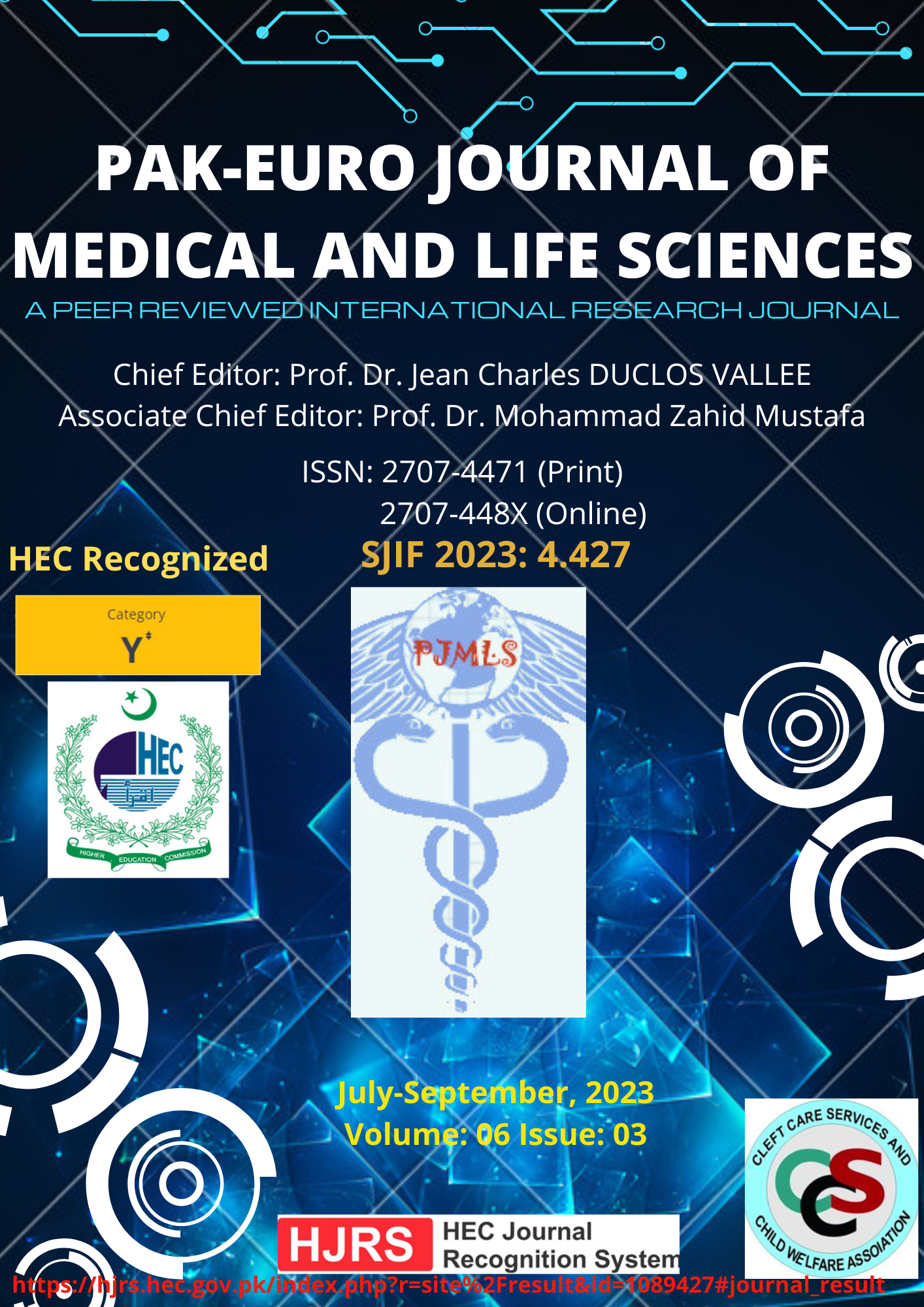Identification of the Causal Agent of Bacterial Soft Rot of Chillies and its Management
DOI:
https://doi.org/10.31580/pjmls.v6i3.3014Keywords:
Chillies, Essential oils, Pectobacterium carotovorumAbstract
It's no doubt that chilli peppers are a lucrative cash crop for farmers all around the globe. Heavy crop losses were incurred as a result of the many variables that affected chilli crop productivity, such as the weather, insect pests, soil quality, and a lack of good producing cultivars. However, abiotic and biotic elements pose the most significant risk to the chilli crops, while biotic factors account for significant annual losses. The damage caused by bacteria is greater than that caused by any other kind of infection. Infectious soft rot of chillies, a significant issue caused by Pectobacterium carotovorum, poses a considerable challenge. Through biochemical and physiological testing, the pathogen responsible for soft rot in chillies was identified and declared as Pectobacterium carotovorum spp. caratovora. To assess the pathogenicity, a mechanical inoculation approach was employed in conducting tests on healthy chillies. Moreover, the study explores the management of pathogen through essential oil (Neem oil, Mint oil, Lemon oil and Cinnamon oil) were prepared by using varied concentrations of 5%, 10%, and 15% and treatment of fifth kept as control. All the concentrations were prepared and were applied against Pectobacterium carotovorum causative agent of soft rot of chillies on nutrient agar inoculating plates for their efficacy. Mint showed highest value of 18.33% inhibition zone, while Lemon found less effective with minimum inhibition zone of 1.79%. Although, the study was in-vitro but it can be very helpful for better management in-vivo condition as well.
References
Olayiwola OO. An economic analysis of chilli crop production in ilora area of oyo state. International Journal of Economics. 2014.
Grubben GJ, Denton OA. Plant resources of tropical Africa 2. Vegetables. Plant resources of tropical Africa 2. Vegetables. 2004.
Moscone EA, Scaldaferro MA, Grabiele M, Cecchini NM, Sanchez García Y, Jarret R, Daviña JR, Ducasse DA, Barboza GE, Ehrendorfer F. The evolution of chili peppers (Capsicum-Solanaceae): a cytogenetic perspective. InVI International Solanaceae Conference: Genomics Meets Biodiversity 745. 2006;137-170.
Khan MT, Qamar Ali QA, Muhammad Ashfaq MA, Muhammad Waseem MW. Economic analysis of open field chilli (Capsicum annuum L.) production in Punjab, Pakistan. Journal of Experimental Biology and Agricultural Sciences. 2017;5(1):120-125
Tiyagi SA, Mahmood IR, Rizvi RO, Dev RT. Utilization of medicinal plants for the management of root-knot and reniform nematodes infecting tomato and chilli. Trends in Biosciences. 2009;2(1):47-9.
Opara EU, Asuquo AA. An overview of characterization and identification of soft rot bacterium Erwinia in some vegetable crops. Greener J. Biol. Sci. 2016;6(3):46-55.
Abu-Obeid IM. Soft rot disease in Jordan: a review. Advances in Environmental Biology. 2019;13(6):1-6.
Abd-El-Khair H, Abdel-Gaied TG, Mikhail MS, Abdel-Alim AI, El-Nasr HI. Biological control of Pectobacterium carotovorum subsp. carotovorum, the causal agent of bacterial soft rot in vegetables, in vitro and in vivo tests. Bulletin of the National Research Centre. 2021;45:1-9.
Sharifi-Rad J, Sureda A, Tenore GC, Daglia M, Sharifi-Rad M, Valussi M, Tundis R, Sharifi-Rad M, Loizzo MR, Ademiluyi AO, Sharifi-Rad R. Biological activities of essential oils: From plant chemoecology to traditional healing systems. Molecules. 2017;22(1):70.
Adamu SH, Lal AA, Simon S. In vitro efficacy of certain botanicals against bacterial soft rot of tomato (Solanum lycopersicum L.). African Journal of Agricultural Research. 2017;12(23):2049-55.
Dadașoğlu F, Kotan R. Identification and characterization of Pectobacterium carotovorum. J Anim Plant Sci, 2017: 27(2):647-654.
Akbar A, Ahmad M, Khan SZ, Ahmad Z. Characterization of the causal organism of soft rot of tomatoes and other vegetables and evaluation of its most aggressive isolates. American Journal of Plant Sciences. 2015;6(4):511-7.
Akar AA, Abbas EE, Tohamy MR, El-Said HM. Effective factors on onion bacterial soft rot disease incidence during storage. Zagazig Journal of Agricultural Research. 2019;46(4):1039-52.
JH J. Susceptibility test methods: dilution and disk diffusion methods. Manual of clinical microbiology. 2007:1152-72.
Mikhail MS, Abdel-Alim AI, Abd-El-Khair H, Abdel-Gaied TG, Shereen AM. Host range and total cellular protein fingerprint of soft rot Erwinia isolated from some vegetables in Egypt. Plant Arch. 2019;19(1):295-306.
Nazerian E, Sijam K, Meor Ahmad ZA, Vadamalai G. Characterization of Pectobacterium carotovorum subsp. carotovorum as a new disease on Lettuce in Malaysia. Australasian Plant Disease Notes. 2013;8:105-7.
El-Habbak MH, Refaat MH. Molecular detection of the causative agent of the potato soft rot, Pectobacterium carotovorum, in Egypt and essential oils as a potential safe tool for its management. Egyptian Journal of Biological Pest Control. 2019;29:1-0.
Downloads
Published
Issue
Section
License
Copyright (c) 2023 Pak-Euro Journal of Medical and Life Sciences

This work is licensed under a Creative Commons Attribution 4.0 International License.






